Coke dealers, meta hipsters, and the gods of indie rock: A night at Barcelona’s Primavera Sound.
6:02 p.m:
I arrive to the press conference late, damp, in a full jog, expecting a sweaty trailer packed like a can of Costa Brava anchovies. After all, this is Animal Collective, the pioneering American rock band, the group whose obscure musical influences could stump Wikipedia, the band that rarely gives fans what they want but always leaves them wanting more. They are considered by some to be the most influential group of rockers on the planet, and they are, without a doubt, the patron saints of Primavera Sound, the massive international music festival that invades Barcelona the last weekend of May each year.
But I don’t find a pack of reporters readying their recorders or a concentration of cameramen fiddling with lenses. I don’t even find an enclosed space that might be mistaken for a press area. Instead, there are a few tables, a few green wicker chairs, and right there, on a couch just a few paces from the Mediterranean, Josh Dibb (aka Deakin’), Brian Weitz (Geologist) and Noah Lennox (Panda Bear).
You might say they look shy or withdrawn or slightly confused, but you also might say they look completely comfortable just sitting there, drinking beer and talking basketball and not really caring whether or not this press conference actually goes down.
Eventually a microphone materializes, a handful of people close in on the couch, and suddenly the conference begins.
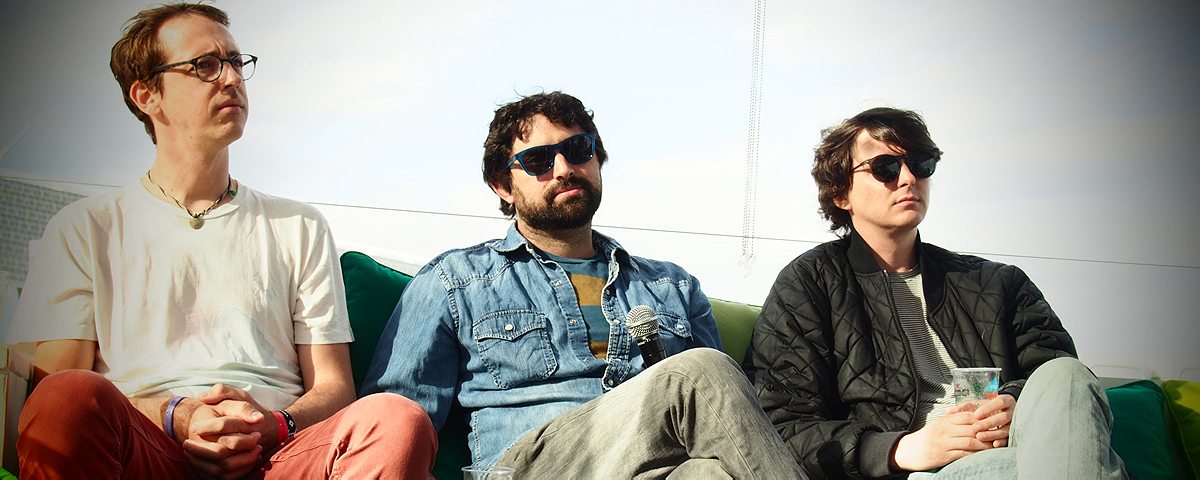
Australian guy with red beard: What makes Primavera such a special event?
Geologist: This is the fourth or fifth time we’ve played here. I’ve always said Primavera was my favorite festival in the world—the only one I’d come to if I wasn’t playing. The lineup is always great, the layout is nice, and it’s in the city.
Peruvian guy: What did you think of playing in Peru a few years back?
Geologist: We loved playing in Peru.
Turkish guy: What do you think of Turkish music?
Panda: We’re all equal fans of the music, I’d say.
Red Beard (again): Would you be prepared to share the funniest, craziest, most inspiring or fucked up moment from Primavera over the years?
Panda: The first time we played here somebody brought a big plant that they were waving around. Like really big. He was just waving it around like a flag. That was a first and a last for us. You just don’t see many people bringing plants to shows.
Me: You know the songs that will make people go crazy, and yet you don’t always play them. Why hold back?
Geologist: There was one time we played Lollapalooza and it was my job to write the setlist that day and an hour set we’ll maybe play seven songs and we finished and we came off the stage and someone from the label came up and was like why no “My Girls” and “Summertime Clothes”? That was a really bold statement to make at Lollapalooza and I just looked down at my piece of paper and said “shit” I swear to god that wasn’t intentional.
Greek guy with blue sunglasses and two fists of Heineken: I’m from Athens and I would like to ask if such a phenomenon as world new fascism affects you?
Deakin’: We’re not a political band. We get bummed about a lot of things in the world, but I don’t think we want to go off on anything today.
Afterwards, people linger around taking photos with the band. In a moment of weakness, I approach Panda Bear and basically tell him his music has changed my life.
“I hope for the better.”
8:43 p.m:
I have never felt the weight of my 32 years as acutely as at this very moment. The crowd would make the flannel-clad denizens of Williamsburg look positively square. Jeans aren’t so much skinny as anorexic. The guy next to me has a neck tattoo of a flaming guitar. Everywhere you look, impossible piercings shine like diamonds in the last gasp of sunlight. This isn’t just average everyday hipsterism at work, it’s meta hipsterism, a form so exaggerated and self-conscious that it feels like performance art.
On stage, Tame Impala, the psych rock crew from Perth, slash and burn their way through their new album, Lonerism, wielding their guitars like battleaxes as they dice the fans—10,000 thick, at least—into tiny little pieces. A cloud of hash and cannabis and lost innocence hangs over the crowd like a patch of fog blown in from the bay. From the looks on the faces of the young women around me, lead singer Kevin Parker could have a very long night in front of him if he so chooses.
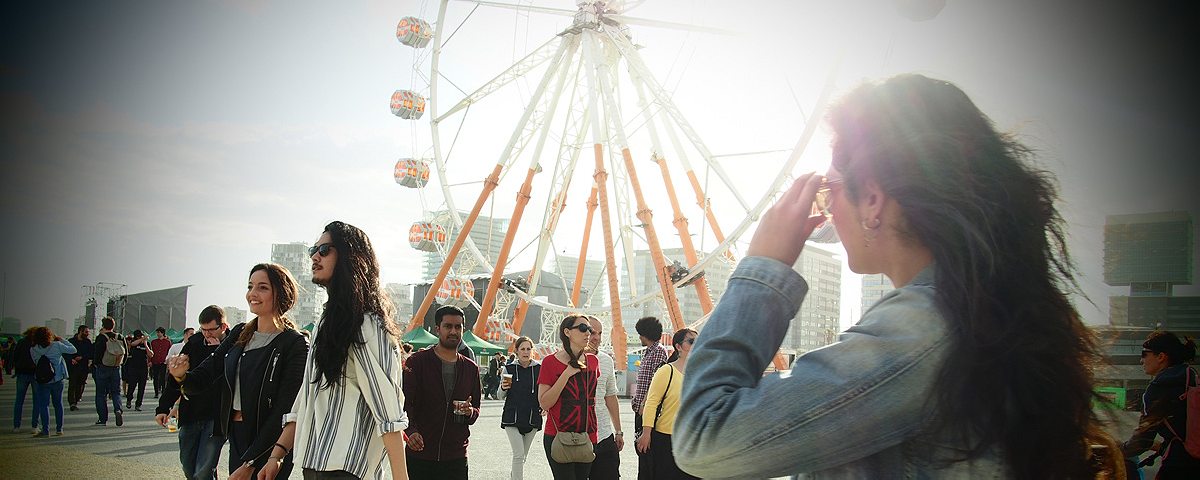
It takes 23 minutes to exit the Heineken stage—the largest and most poorly situated of Primavera’s many venues. By the time we make it to the concession stands, the communal smoke session has rendered the masses ravenous; the line for a hot dog stretches into tomorrow. Barcelona’s burger boom has hit Primavera hard, rendering two out of every three food options a tricked-out patty of some sort, but I would rather starve than wait 90 minutes for a 9€ hockey puck.
I make for the press area, where the classy sit-down dining option is currently being suffocated by a snaking line of cheap journos looking to cash in on the press badge’s best feature: the 1€ cups of Heineken. Sporting a strong contact high, I consider for a moment buying a 20€ sirloin and a bottle of cava, but come to my senses just in time. Instead, I settle on two bags of Doritos and a whisky cola.
This is my third year at Primavera Sound, and among the best parts of the festival has always been the relative order of it all: lines for beers are short, the bathrooms stay clean, and the breeze from the Mediterranean keeps the whole event from descending into a swamp of hygienic decay. Only this year, the crowds have swollen, the lines have doubled, and nobody seems to be speaking Spanish anymore.
While the Spanish economy spirals ever downwards, the price for Primavera continues to climb. A single day pass can run up to 100€, not something Spain’s unemployed youth can stomach, but from the looks of it, the festival has attracted more than enough Brits, Germans, and Americans to fill the void. Attendance is up 20,000 this year; over the course of the next three days, 170,000 strong will roam this concrete jungle.
Officials put the foreign attendance rate at 40 percent, but I’d be shocked if more than a quarter of the people here know what este festival está lleno de guiris means. One thing is undeniable, though: Spaniards know how to get the most out of their money, so those who have come arrive with the full intention of milking this thing for every last magical moment. With Day 1’s last act taking the stage at 4:30 a.m., there will be ample opportunity to kill the night together.
10:50 p.m.
Almost nothing in Spain runs on time except Primavera Sound. It’s the Swiss train of international music festivals. Which is why, at precisely 10:50 p.m., Bradford Cox, Deerhunter’s eccentric frontman, walks out onto stage and thrusts the band headfirst into a 50-minute set. He’s all of a 120 pounds, dressed in a spotted dress with a face so white you begin to wonder if the man unleashing these guttural sounds is an apparition, some twisted specter of his former self. The ghost face of the full moon looming large over his left shoulder only confuses further.
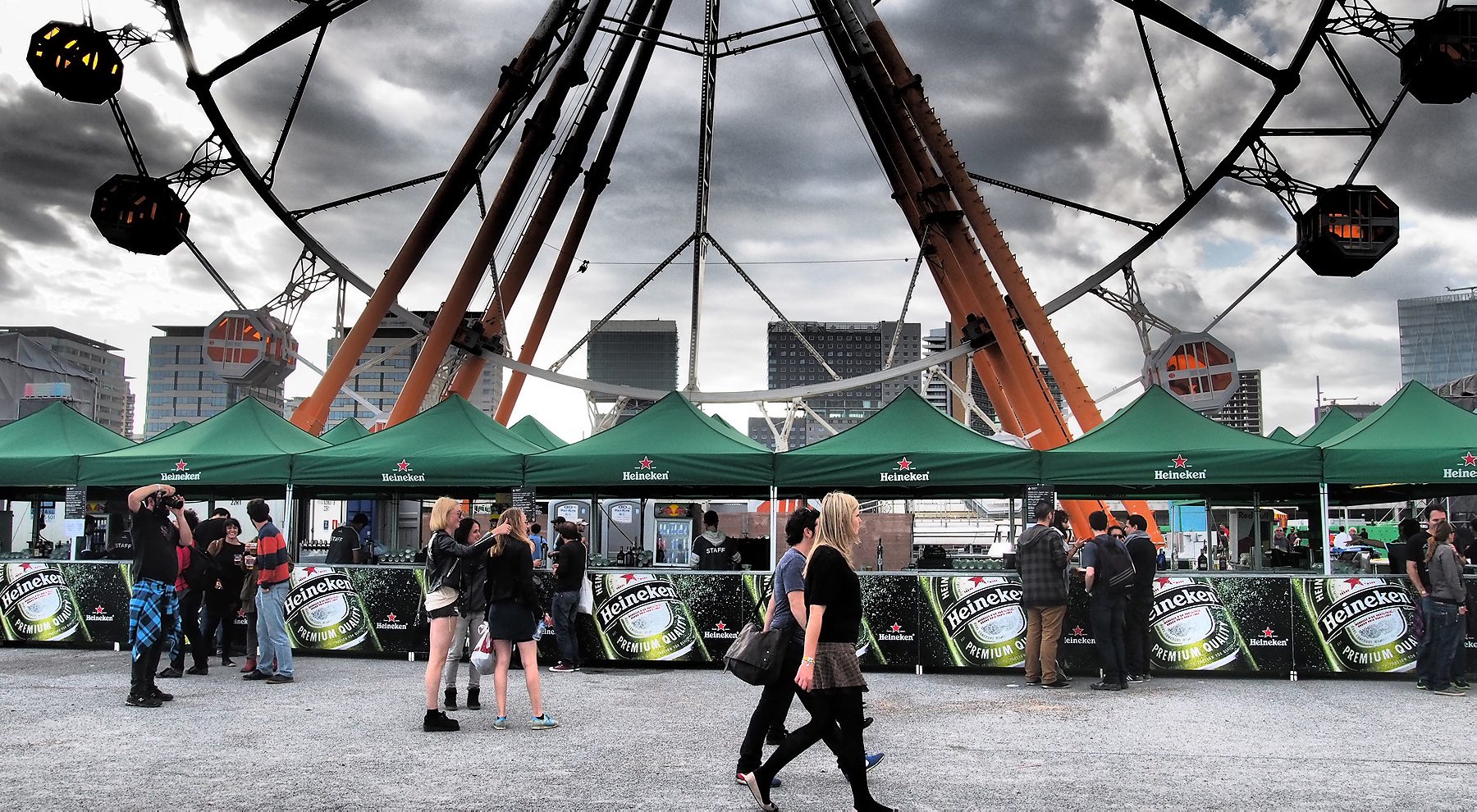
Deerhunter is playing at the Ray Ban stage, one of eight main stages located in the very center of Barcelona’s Parc del Forum, the home of Primavera since 2005. The venue itself is a strange jumble of concrete, grass and sea, with hills and valleys and hidden corners, meaning that eight bands can play at once without any chance of diluting the tunes of your band of choice. There are no camping grounds, no communal showers, and, as far as I’ve been able to discern over the years, no dark corners where unspeakable things go down. There is a massive ferris wheel this year, however, which, combined with Cox’s ringwraith appearance, gives the festival a certain unsettling edge. But this is no small town carnival gone awry; as much as any festival you’ll find in Europe, Primavera Sound is an urban event, with satellite concerts sprinkled throughout Barcelona’s parks and clubs and a seven-stop metro ride from the city center to the main venue.
As Deerhunter builds to a feverish finish, Cox suddenly drops his guitar and walks off the stage. The chords continue, but Deerhunter vanishes into the night. The crowd cheers and waits for an encore, but there will be no encore; at Primavera, there is never an encore, only the next act.
12:18 a.m.
When the electric squid drop from the rafters, their tentacles shining gold in the Spanish night, every smokehead in the crowd reaches for his stash. When the first few bars of “Yet Again” ring out, a kid in a tank top and a fishing hat slithers by and offers me coke. And when the piano line behind “Two Weeks” kicks in, the entire crowd begins to close in on itself.
It’s been a big year for Grizzly Bear, and everything about their performance—the super polished transitions, the shit-eating grins on their faces, the starry-eyed followers swaying at their feet—suggests a group fully secure in their position as indie rock gods. In fact, every group I’ve seen today—Tame Impala, Savages, Deerhunter, and now Grizzly Bear—have released albums that will end up on most critics’ years’ best lists, a reminder of Primavera’s primary virtue: its ability to secure quality independent acts year after year. Over the past three festivals, the good folks behind the programming have delivered to my backyard nearly every band I care about across a reasonably wide spectrum of genres. But it’s not just the big names that make it special; the attention given to smaller bands and to local Spanish and Catalan musicians means that any one with their eyes open and their ears unplugged will come out with a few new groups to squeeze into their rotations.
Grizzly Bear finishes their set with a 7-minute rendition of “Sun in Your Eyes” and the masses splinter off in all directions. Some break out in full sprints to distant stages. Some dart to the nearest dark corner to relieve themselves. Others head just outside the gates, where a legion of street vendors lie in wait with cold 1€ cervezas—the cheapest way to stay drunk until the sun comes up. It’s nearing 2 a.m., which in Barcelona time means people are just getting warmed up.
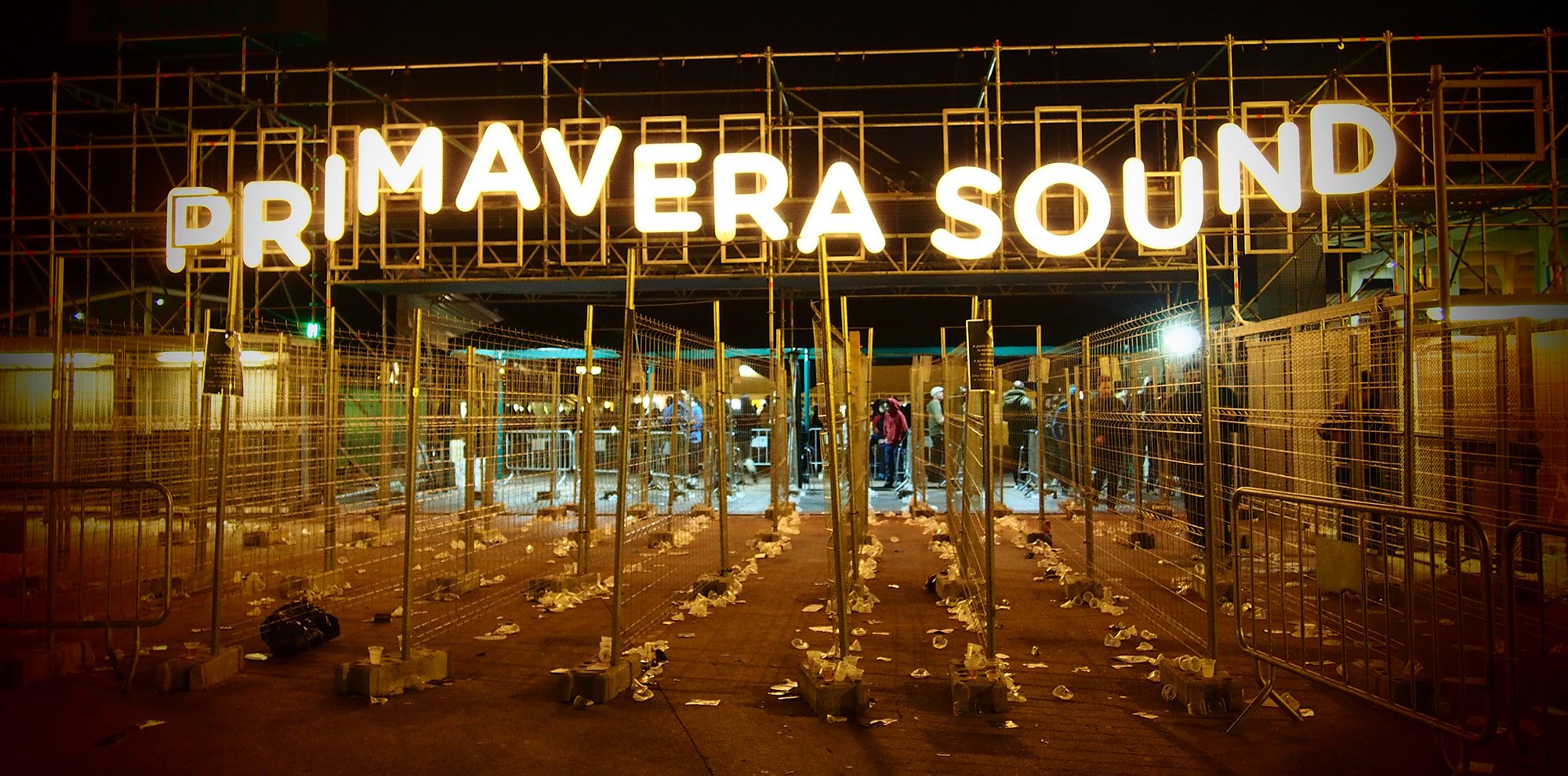
3:00 am:
The first time I saw Animal Collective, in 2011, I stood a few rows back from center stage as the first sonic wave washed over the crowd. It was a moment I had been waiting for since the first time I heard the chirps and screeches and vibrating melodies of Sung Tongs flood my headphones. Just as they were settling into the set, a friend took a few puffs from a joint and passed out cold on the spot. The crowd parted, a meaty security guard emerged from behind the band, flung her over his back like a used gym towel, and carried her across the stage. All the while, Animal Collective played the same extended bridge—enough to keep the crowd moving, not too much to impede the rescue. My night, however, had ended as I headed out with the security guard.
I saw just one song that year, but I have reclaimed my same spot in front of the stage and have made sure all companions are sober enough to stay perpendicular for the entirety of the show. As people begin to flood in from all sides of the Forum, a crew on stage inflates what appear to be giant appendages stolen from a Dr. Seuss book. Eventually, as the arms form an oval around the stage and the massive teeth fill with air, it becomes clear that we’re all staring into some kind of nightmarish mouth—a dentist’s view on acid. Just after three in the morning, the four-member crew strolls out and takes their positions in the center of the mouth and the most anticipated set of Primavera begins.
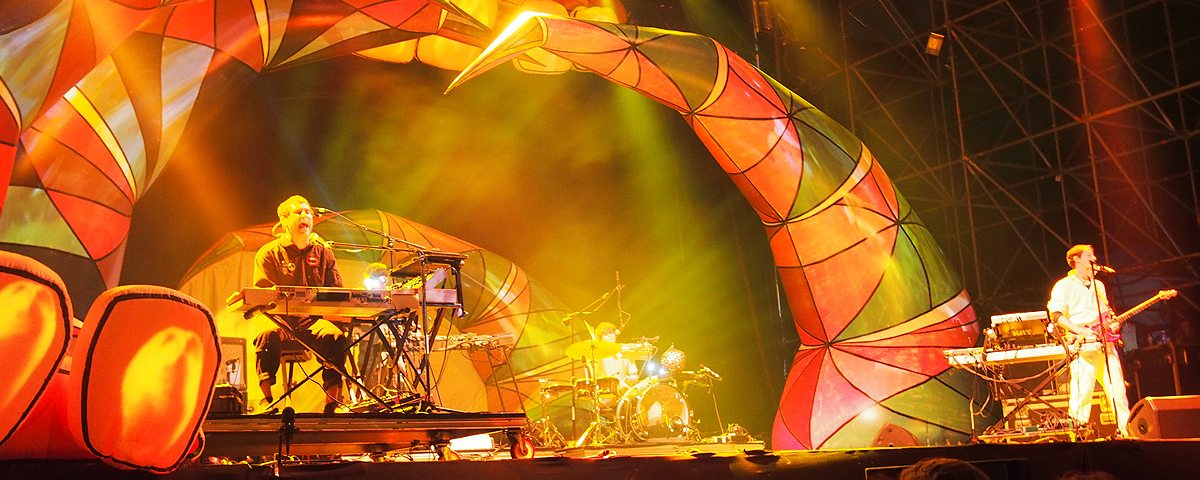
The songs are dense, meandering, and for certain short stretches of time, deeply satisfying. Two young blissed-out Americans wedge their way in front of me, flailing their limbs and licking each other’s faces like giant lollipops. It’s a confusing display of festival euphoria, and everyone around can’t decide whether to push them to the ground or pat them on the back.
It’s late now, and with sunrise and the promise of 127 more bans looming on the horizon, it feels like Animal Collective may just lose the crowd entirely. But then, the first shimmering synth notes of “My Girls” ring out and everyone stands still, almost unwilling to believe that this might happen—that the most popular band in one of the most popular festivals in the world might actually play the most popular song they’ve ever written.
But the music slides around and the synthesizer grows quiet and nobody seems sure if they’re actually going to do it or if this is some twisted joke. A massive German guy in a Bayern Munich jersey next to me cups his hands and yells “My Girls!!!” at the top of his lungs, hoping to will the song forward with his baritone bellow. As the uncertainty builds and the tension builds and the 20,000 people behind me consider walking away from it all, those sparkly synth notes return and Panda Bear leans towards the mic mounted on his drum set and begins to sing.
There isn’t much that I feel I need
The crowd exhales, then cheers wildly, and it feels, for a minute at least, that Primavera has just begun.